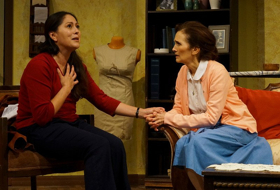Review: THE MADRES at MOXIE Theatre

At the beginning of THE MADRES, when Josefina remarks that she "misses entertaining" and having a "house filled with people" one cannot help but think an unexpected visit from a priest with connections to the government, or a young man she watched grow up arriving in a military uniform accessorized with a fanatic ideology is what she meant. Yet, as THE MADRES now playing at MOXIE Theatre through June 10th shows, in 1978 Argentina, there is nothing normal about what is happening around them.
Josefina (María González) lives in an apartment with her daughter Carolina (Sandra Ruiz), in a perfectly ordinary neighborhood. Josefina mends clothes, bakes, cleans house, and is as clean cut, conservative, and Catholic as anyone in the country could hope someone to be. She keeps up all this pretense to distract from her worry about her daughters activist activities and her granddaughters recent disappearance. So it is a surprise when she sees Padre Juan (John Padilla), their long departed parish priest who now works at ESMA, a notorious building for detaining, torturing, and murdering any political dissidents arriving at her front door.
The Padre mentions that he came by to warn Carolina to stop marching as he has heard a rumor that her daughter Belén, is a desaparecida (the missing/disappeared). At her insistence that her granddaughter is a good person so why would she be missing he ominously warns "Jesus wouldn't survive this junta (military coup)" before he departs.
When your government has been abducting people in the middle of the night for them never to return, or worse rain down from the sky into the ocean, this is not a warning anyone wants to hear.
When Carolina returns to the apartment, wearing her Madres white headscarf, the women discuss what can be done. Josefina is the more calm and strategic one, with Carolina more emotional and impulsive. Carolina refuses to be silenced, or worse, play the part of quiet, conservative like her Mother.
John Padilla & Markuz Rodriguez Photo by Daren Scott" height="234" src="https://cloudimages.broadwayworld.com/upload12/1837398/images/The%20MAdres%202.jpg" width="350" />
Their next visitor is a young man from the neighborhood named Diego (Markuz Rodriguez), who is now a crisp and tailored soldier who believes and enforces the new government's ideology. He comes by asking about Belén and her husband ,and what Josefina and Carolina may know about them and their friends. For all his friendly smiles and assurances, menace lurks beneath.
Desperate to know if Belén is even still alive, they come up with a plan to throw a baby shower for her. They have heard that "disappeared" people have sometimes turned up at major special events for families, under military chaperone, so the government can try to assuage any fears or doubts. Cue the most awkward and tense baby shower in the history of baby showers.
González as Josefina is excellent as she tries to balance her reputation as an ideal citizen with her frustration and worry. She is even better once the character has decided to fight for information, her granddaughter, and against the injustice of it all using what's available to her; even if that may be baby food, diapers, and freshly baked goods.
Ruiz as Carolina brings an intensity and recklessness to her character as she is spurred into action by the events around her. Padilla is strong as Padre Juan, as is Rodriguez as Diego the smug and superior soldier.
Co-directed by Maria Patrice Amon and Jennifer Eve Thorn this show keeps the pacing and the tension as tight as possible. The tension is really built on the polite social fiction they all play, as they hide true motives and feelings from each other. The occasional outburst of emotion shows the tumultuous undercurrent that may be hiding beneath these calm and polite waters.
Written by Stephanie Alison Walker, this show explores a history many know little about, so there is a lot of exposition in the first act. This leads to an uneven balance between information loading and then action, in repetition. The second act is much more streamlined, and keeps up the tension all the way to the very end.
Yet, even by the end there are some questions. What is the Padre's role in all of this and why is he really there? For someone who preaches one thing and then works for a government that he knows for a fact has killed nuns, this would be interesting insight into this character and motivations.
It is a universal fact that there can be no more formidable opponent than an angry mom. The impassioned delivery of the closing lines by González are riveting and give a voice to the actual Madres who marched, and some who continue to march to this day, every Thursday in the public square. They can be seen by their white head coverings, many times cloth diapers with the missing children's names embroidered on them, turning the ultimate sign of domesticity and motherhood into an effective political weapon.
Though this dictatorship only lasted about 7 years, up to 30,000 victims were "disappeared" and never seen again. As of now, thorugh a DNA database they have found 114 grandchildren of these women that were given to "loyal" families to rise in the correct ideology and with no ties to their former families.
THE MADRES is a thought and emotion provoking play, showing that freedom and democracy are only as strong as those citizens who will fight against those abusing their power.
THE MADRES is playing at the MOXIE Theatre through June 10th. For tickets and show time information go to www.Moxietheatre.com
Photo Credit: Daren Scott
Reader Reviews
Videos

